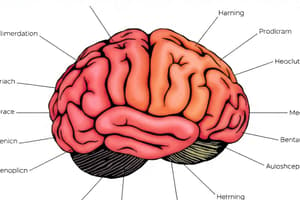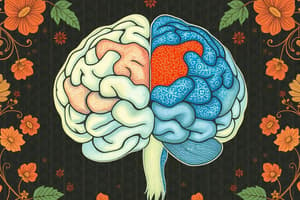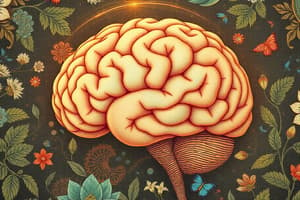Podcast
Questions and Answers
Which type of memory is automatic and consists of unconscious skills?
Which type of memory is automatic and consists of unconscious skills?
- Implicit Memory
- Semantic Memory
- Explicit Memory
- Procedural Memory (correct)
Which type of memory is our memory of facts, concepts, and knowledge about the world?
Which type of memory is our memory of facts, concepts, and knowledge about the world?
- Procedural Memory
- Implicit Memory
- Explicit Memory
- Semantic Memory (correct)
Which type of memory is our memory of specific events that we have experienced?
Which type of memory is our memory of specific events that we have experienced?
- Procedural Memory
- Implicit Memory
- Explicit Memory
- Episodic Memory (correct)
What is the process of turning sensory memory into working memory called?
What is the process of turning sensory memory into working memory called?
What type of amnesia is the loss of memory for events and experiences that happened before the amnesia-causing event?
What type of amnesia is the loss of memory for events and experiences that happened before the amnesia-causing event?
True or false: Long-term memory consists of things that are meaningful to us, our experiences, facts and knowledge, and things that are automatic to us.
True or false: Long-term memory consists of things that are meaningful to us, our experiences, facts and knowledge, and things that are automatic to us.
True or false: Implicit memory is also known as non-declarative memory and refers to memories that are almost unconscious.
True or false: Implicit memory is also known as non-declarative memory and refers to memories that are almost unconscious.
True or false: Procedural memory is a type of implicit memory and consists of unconscious skills that we have once learned to help us perform various tasks.
True or false: Procedural memory is a type of implicit memory and consists of unconscious skills that we have once learned to help us perform various tasks.
True or false: Explicit memory is also known as declarative memory and refers to conscious memories that a person is completely aware of.
True or false: Explicit memory is also known as declarative memory and refers to conscious memories that a person is completely aware of.
True or false: Semantic memory is our memory of specific events that we have experienced.
True or false: Semantic memory is our memory of specific events that we have experienced.
What are the two types of long-term memory discussed in the text?
What are the two types of long-term memory discussed in the text?
Explain the difference between semantic memory and episodic memory.
Explain the difference between semantic memory and episodic memory.
What is the process of turning sensory memory into working memory called?
What is the process of turning sensory memory into working memory called?
What are the three stages of information processing model and how do they relate to attention and perception?
What are the three stages of information processing model and how do they relate to attention and perception?
How does attention influence perception according to the information processing model?
How does attention influence perception according to the information processing model?
Explain the two directions in which information processing is influenced according to the information processing model.
Explain the two directions in which information processing is influenced according to the information processing model.
What is hypnosis and how is it different from normal waking consciousness?
What is hypnosis and how is it different from normal waking consciousness?
What are some practical applications of hypnosis?
What are some practical applications of hypnosis?
What is meditation and how does it bring about an altered state of consciousness?
What is meditation and how does it bring about an altered state of consciousness?
What is the main difference between hypnosis and meditation?
What is the main difference between hypnosis and meditation?
What is the main purpose of meditation?
What is the main purpose of meditation?
What are the potential benefits of long-term meditation practice?
What are the potential benefits of long-term meditation practice?
What does the process of meditation typically involve?
What does the process of meditation typically involve?
According to psychologist Ernest Hilgard, what are the evidence that hypnosis is a state of consciousness different from normal waking life?
According to psychologist Ernest Hilgard, what are the evidence that hypnosis is a state of consciousness different from normal waking life?
True or false: Hypnosis is a controversial topic and there is disagreement about whether it represents a state of consciousness different from normal waking consciousness?
True or false: Hypnosis is a controversial topic and there is disagreement about whether it represents a state of consciousness different from normal waking consciousness?
True or false: Hypnosis has been used in various areas such as controlling pain, reducing smoking, treating mental health, assisting in law enforcement, and improving athletic performance?
True or false: Hypnosis has been used in various areas such as controlling pain, reducing smoking, treating mental health, assisting in law enforcement, and improving athletic performance?
True or false: Meditation is a learned technique for refocusing attention that can bring about an altered state of consciousness?
True or false: Meditation is a learned technique for refocusing attention that can bring about an altered state of consciousness?
True or false: Sensation is limited by attention?
True or false: Sensation is limited by attention?
True or false: Perception requires attention?
True or false: Perception requires attention?
True or false: Bottom-up information processing is influenced by our prior knowledge and expectations?
True or false: Bottom-up information processing is influenced by our prior knowledge and expectations?
According to the information processing model, which direction influences perception by taking into account our prior knowledge and expectations?
According to the information processing model, which direction influences perception by taking into account our prior knowledge and expectations?
Which stage of the information processing model involves the process of turning sensory memory into working memory?
Which stage of the information processing model involves the process of turning sensory memory into working memory?
True or false: Sensation is unlimited according to the information processing model?
True or false: Sensation is unlimited according to the information processing model?
What is the main difference between hypnosis and meditation?
What is the main difference between hypnosis and meditation?
According to the information processing model, which type of memory consists of unconscious skills that we have once learned to help us perform various tasks?
According to the information processing model, which type of memory consists of unconscious skills that we have once learned to help us perform various tasks?
During which stage of sleep do we experience slow breathing and irregular brain waves called theta waves?
During which stage of sleep do we experience slow breathing and irregular brain waves called theta waves?
What are the bursts of brainwave activity called that are characteristic of stage 2 sleep?
What are the bursts of brainwave activity called that are characteristic of stage 2 sleep?
Which stage of sleep is characterized by large slow delta waves and is considered deep sleep?
Which stage of sleep is characterized by large slow delta waves and is considered deep sleep?
What is the stage of sleep in which the eyes move rapidly under the eyelids and the person typically experiences dreaming?
What is the stage of sleep in which the eyes move rapidly under the eyelids and the person typically experiences dreaming?
How long does a typical sleep cycle last?
How long does a typical sleep cycle last?
What is the capacity of sensory memory?
What is the capacity of sensory memory?
Which brain region plays a role in the storage of emotional memories?
Which brain region plays a role in the storage of emotional memories?
What is another term for working memory?
What is another term for working memory?
Which type of memory is used in planning, problem solving, and perception?
Which type of memory is used in planning, problem solving, and perception?
What type of memory receives information from both sensory memory and long-term memory?
What type of memory receives information from both sensory memory and long-term memory?
Which brain region holds memories from your immediate past and dispatches them to the cortex?
Which brain region holds memories from your immediate past and dispatches them to the cortex?
What is the deciding factor of whether sensory memory is transferred to short-term memory?
What is the deciding factor of whether sensory memory is transferred to short-term memory?
Which type of memory is our memory of facts, concepts, and knowledge about the world?
Which type of memory is our memory of facts, concepts, and knowledge about the world?
What is the main function of the frontal lobes in memory?
What is the main function of the frontal lobes in memory?
Which type of memory is automatic and consists of unconscious skills?
Which type of memory is automatic and consists of unconscious skills?
What is the main function of long-term memory?
What is the main function of long-term memory?
Which type of memory is responsible for unconscious skills?
Which type of memory is responsible for unconscious skills?
What is an example of procedural memory?
What is an example of procedural memory?
Which type of memory is responsible for conscious memories?
Which type of memory is responsible for conscious memories?
What is an example of semantic memory?
What is an example of semantic memory?
What is an example of episodic memory?
What is an example of episodic memory?
What is the process of turning sensory memory into working memory called?
What is the process of turning sensory memory into working memory called?
What is the term for the inability to remember information due to physiological trauma?
What is the term for the inability to remember information due to physiological trauma?
Which type of amnesia is the loss of memory for events and experiences that happened before the amnesia-causing event?
Which type of amnesia is the loss of memory for events and experiences that happened before the amnesia-causing event?
Which type of amnesia is the loss of memory for events and experiences that occurred after the amnesia-causing event?
Which type of amnesia is the loss of memory for events and experiences that occurred after the amnesia-causing event?
Flashcards are hidden until you start studying
Study Notes
Understanding Memory and Amnesia
-
There are different types of memory, including sensory memory, working memory, and long-term memory.
-
Sensory memory is produced by our senses and has a large capacity, but whether it is transferred to short-term memory depends on attention.
-
Working memory, also known as short-term memory, processes information used in planning, problem-solving, and perception.
-
Working memory receives information from both sensory memory and long-term memory.
-
Long-term memory consists of memories that stay with us in long-term storage and includes meaningful experiences, facts, and automatic knowledge.
-
Long-term memory can be further categorized into explicit (declarative) memory and implicit (non-declarative) memory.
-
Explicit memory is conscious memory of specific knowledge and can be semantic (facts and concepts) or episodic (specific events experienced).
-
Implicit memory is almost unconscious and includes procedural memory, which is unconscious memory of skills and habits.
-
The brain regions involved in memory include the frontal lobes, hippocampus, and amygdala.
-
The frontal lobes are heavily involved in working memory and are connected to planning and attention.
-
The hippocampus holds memories from the immediate past and dispatches them to the cortex for storage in long-term memory.
-
The amygdala plays a role in the storage of emotional memories.
-
Amnesia is the inability to remember information, often due to physiological trauma.
-
There are two types of amnesia: retrograde amnesia, which is the loss of memory for events before the amnesia-causing event, and anterograde amnesia, which is the loss of memory for events after the amnesia-causing event.
Studying That Suits You
Use AI to generate personalized quizzes and flashcards to suit your learning preferences.




